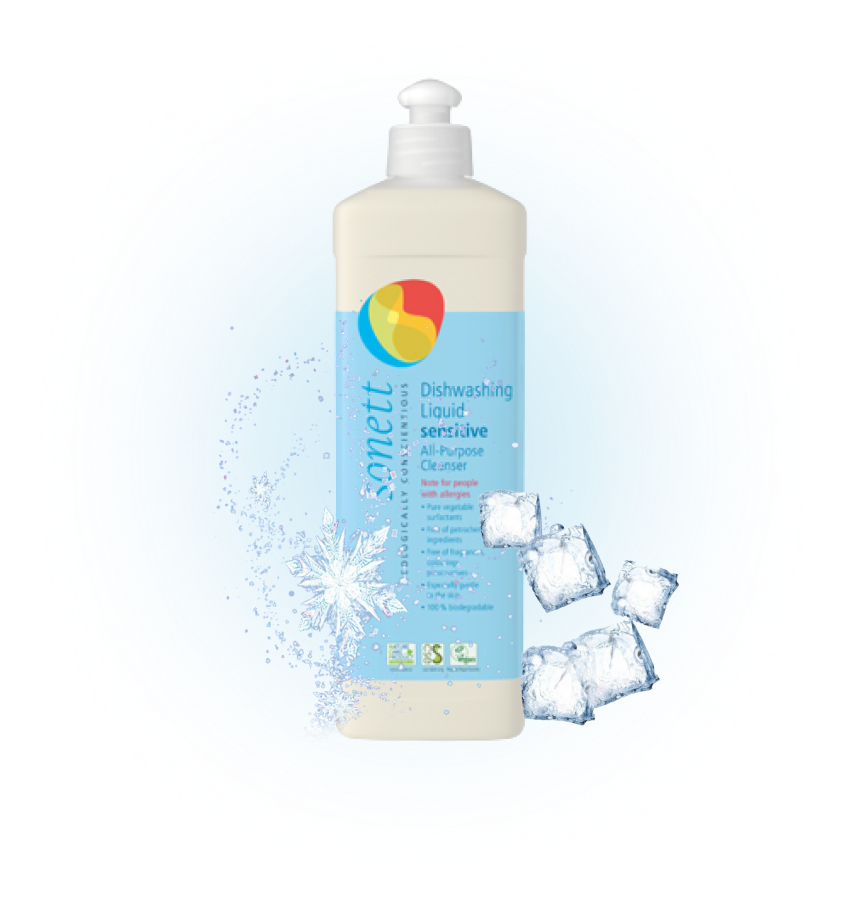All-Purpose Cleanser sensitive
Ingredients
Product declaration
Sugar surfactants 5–15 %
Coconut oil alcohol sulphate 1–5 %
Vegetable alcohol (ethanol) 1–5 %
Common salt <1 %
Citrate <1 %
Water, swirled up to 100 %
List of ingredients as per EC 648 / 2004
Aqua, alkylpolyglucoside C10–C16 (lauryl glucoside), sodium C8–C14 fatty alcohol sulphate (sodium octyl sulfate, sodium lauryl sulfate), alcohol, sodium chloride, sodium citrate
Origin and properties of the ingredients
Sugar, starch, and coconut oil serve as raw materials for the sugar surfactants used. Combined with coconut oil alcohol sulphate, produced from coconut oil and sulphur oxides, they form a combination of substances which complement each other, increase their cleansing performance and possess excellent fat-dissolving properties as well as outstanding skin tolerance.
Technical data
Density: 20 °C approx.1.027 g / cm³
68 °F approx. 0.037 oz / in³
pH value: 20 °C, 5 g / litre H₂O
68 °F, 0.18 oz / 34 fl oz US H₂O approx. 7–8
At temperatures below 10 °C (50 °F), the product changes becoming slightly more solid and whitish; a phase which will pass, however, once the product is exposed to warmth and by shaking it lightly, if necessary.
Application
Special product feature
This fragrance-free liquid for manual dishwashing and cleaning being concentrated, it is very economical in its use. The surfactants used, i.e. coconut oil alcohol sulphate and sugar surfactants, present one of the best degradation rates in waste water–being surpassed by soap only–and a very good skin tolerance as well.
Ranges of application
Cleans and protects floors, tiles, washbasins, kitchen furniture, cars, etc. Suitable for large-area cleaning of windows.
Application
Cleans and protects floors, tiles, washbasins, kitchen furniture, cars, etc. Suitable for large-area cleaning of windows.
Dosage
5–10 ml (½–1 tablespoon) per 10 litres of water, depending on the degree of soiling.
Dosage undiluted
Apply a few drops to a sponge or moistened cloth.
Ecology
Biodegradability
Despite constituents being extracted from the plant-based raw materials starch, sugar, and fat during the manufacturing process of sugar surfactants and coconut oil alcohol sulphate, they remain completely intact in their natural structure. That makes it quite easy for microorganisms to 100 % decompose these surfactants very quickly. Sugar surfactants and coco-nut alcohol sulphate are classified as being readily biodegradable according to OECD guidelines.
Suitable for septic tanks and filtration systems.
Certification
CSE (Certified Sustainable Economics)
Packaging
Bottle, canister: PE
Cap: PE / PP
Label: PE
Outer carton: 100 % rec. mat.
Contact Us
And be the first one to receive a present from our partner Sonett.
